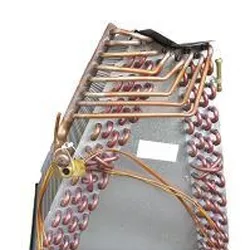AC Coils Freezing Up? When to Call a Pro
- Tagged:
- Tips
An air conditioner that “freezes up” is actually a victim of the A/C coils freezing up. As a result, homeowners may find themselves without any air conditioning, and will need to troubleshoot the system or call a pro.
When A/C coils freeze, there could be a simple solution to the problem; however, more complicated scenarios may have caused the freezing. Before you call a pro, it pays to investigate the source of the problem.
The evaporator coil is prone to freezing, primarily because it transfers heat, or evaporates it, from the indoor to the outdoor air. In the process, it also drains a lot of condensation. When problems occur, this condensation can form a block of ice around the coil, causing it to freeze. At this point, the air conditioner won’t work anymore.
Four primary factors lead to the A/C coils freezing up:
- A dirty filter
- A dirty coil
- Too little airflow
- Low refrigerant
Regardless of the cause, frozen coils prohibit heat from dissipating as it moves over the coil, the coil becomes overcooled, and condensation and ice can form. Follow these steps to troubleshoot coil freeze:
Shut down the A/C by setting the thermostat to “off.”
Check the filter. If it’s dirty, it’s likely restricting airflow. Install a new filter, and turn the A/C back on. If the filter was the problem, the coils should begin to thaw, and the air conditioner should begin running soon.
If the problem does not resolve itself, other factors to consider include:
- A wet filter may indicate that the coils are frozen, as the large amount of condensate is averting the drain pan.
- The coil itself is likely dirty, which can inhibit heat transfer as well as airflow.
- Refrigerant levels may be too low.
In the case of a wet filter, dirty coil or low refrigerant, it’s best to let a professional diagnose the problem. Contact Jon Wayne today or learn more on our AC repair page.
- Tagged:
- Tips


